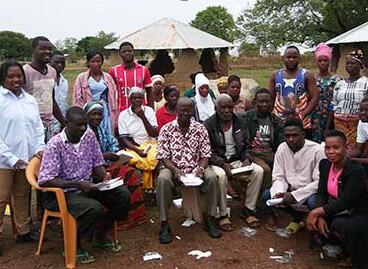ACES PhD student LaKisha David facilitating monumental reunions of ancestral families separated during the Transatlantic Slave Trade

The following are reflections from LaKisha David, a PhD student in Human Development and Family Studies, on her research project, which was partially funded by an ACES International Graduate Grant: “Northern Ghana Family Reunification Project.” LaKisha's advisor is Dr. Christy Lleras.
"Families that were separated during the Transatlantic Slave Trade are reuniting using commercially available genetic testing that allows consumers to identify relatives within a database. When African Americans test, they are finding that they share a significant amount of DNA with Africans within the database. In June 2018, with the assistance of the ACES International Research Grant, I traveled to Paga, Ghana to conduct a study with members of the Kassena ethnic group to understand what this reunification process means to them. I wanted to understand if they considered African Americans living in the U.S. with whom they shared a significant amount of DNA with as family. I also wanted to understand the meanings and expectations that they associated with family.
Members of the Kassena ethnic group living in the village of Nania within the city of Paga, Ghana were selected because they have a community narrative of raiders breaking into their homes and taking away their ancestors. Within Nania is the former Pikworo Slave Camp, a historical site open to tourists willing to learn about the area’s enslavement history and to tour the grounds where area enslaved people were imprisoned before being sold. Using the ACES International Research Grant, I was able to purchase several DNA testing kits and have them processed to see if African American descendants of the ancestors who were taken could be found within the testing company’s database.
In June 2018, I traveled to Ghana with the HDFS 379/AFRO 398 Ghana Study Abroad professor Christy Lleras and the nine other students in the course. We hosted a community event with food on the grounds of the Pikworo Slave Camp. Although the project idea was developed with community members two years ago, the purpose of community event was to continue to build rapport between myself, the residents of Nania, and the study abroad group. We planned for 100 people to attend. At least 300 people showed up! And there was an impromptu dance competition between the elderly ladies of Nania and the study abroad group! The elderly ladies won, of course.
The next day, we met with the participants of the research project. In June and July 2018, we facilitated five focus group discussions and administered autosomal DNA tests. I also visited with a government representative of Nania (who promised his on-going support of the project) and personnel at the Navrongo Health Research Centre (where the project was approved through an ethics review process). I also had the opportunity to visit with friends in the village and to be generously hosted by Gabriel Kugoriamo’s family. I have a greater appreciation for the work that the women of the village do, and I still feel guilty for how much water I used after seeing them draw water and carry it on their head from a nearby well.
After returning to the U.S. and the receiving the DNA results, we found enough shared DNA between residents of Nania and African Americans within the database to continue the study. Between sharing a significant amount of DNA to indicate that it was inherited from the same pair of ancestors and matching multiple people within a family, we believe that the African Americans identified within the database were indeed descendants of those who were taken away from the same family in Africa of some of the Nania residents. By inference, families that were separated during the Transatlantic Slave Trade are reuniting.
While people in the database were contacting me asking about the new exciting genetic match with an African person that showed up in their results, I began leading a team of 5 undergraduates in analyzing the focus group data with the guidance of professors Christy Lleras and Shardé Smith. The research team members were also part of the community event in Ghana, so they had a particular insight into the analysis. One undergraduate also found a way to focus on one set of interview questions and data to produce another related study. We plan to submit our findings to the National Council on Family Relations (NCFR) annual conference in Fort Worth, TX, U.S. and the 2019 Ghana Year of Return conference in Accra, Ghana.
The ACES International Research Grant enabled me to not only be present to study the change or maintenance of family meanings for the Kassena people but to also facilitate monumental reunions of members of an ancestral family that was separated during the Transatlantic Slave Trade. For those that maintain those transnational relationships, it is a change that will last a lifetime with ripple effects in the generations to come. As a researcher striving to maintain my connection with the participants of this study and the Nania community in general, I am positioned to witness, study, and help manage this reunification and transnational family formation over time. I am grateful to the donors, reviewers, and decision makers that contributed to the funding of this work."